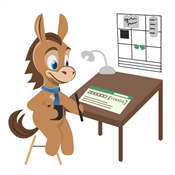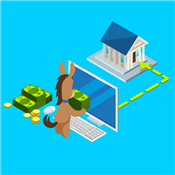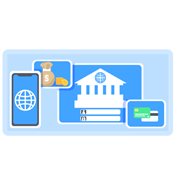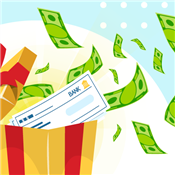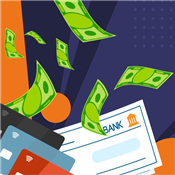Where to Get a Money Order Near Me
What stores sell money orders? And can you get one online? Read on to learn where to get a money order and how much it will cost.
 |
| © CreditDonkey |
Like a check, a money order transfers payment from one person to another—but with less risk, since the payment is guaranteed.
People commonly use money orders if they don't have a checking account or when they want to keep their checking account information private. It also serves as a good alternative to cash because you get proof of payment.
When you buy a money order from an institution, they keep the money until the recipient cashes it. This eliminates the risk that a bounced personal check creates.
Keep reading to learn where to get a money order.
Where to Buy a Money Order
You can buy a money order from one of the following institutions or their authorized agents:
- Western Union
- MoneyGram
- USPS
The fees are usually similarly priced, so you may want to choose a location based on convenience. Keep reading to learn more.
Walmart
Depending on the location, Walmart sells MoneyGram money orders at their customer service desk or Money Services Center.
| Factor | Condition |
|---|---|
| Cost | Up to $0.88, exact fees vary by location |
| Amount | Up to $1,000 per money order |
| Allowed Method of Payment | Cash or debit card |
| Documentation Required | Valid photo ID for purchases higher than $1,000 |
| Cashing Money Orders | $4 per money order cashed |
Kroger
Kroger and its affiliates—Fry's, King Sooper, Dillon's, Pay Less, Smith's, and Fred Meyer's—sell Western Union money orders at the Money Services center.
| Factor | Condition |
|---|---|
| Cost | Fees vary by location, but the Kroger shopping card may save you money on the fees |
| Amount | Up to $1,000 (may vary by state) |
| Allowed Method of Payment | Cash |
| Documentation Required | Government ID may be required (varies by location) |
| Cashing Money Orders | Fees and limits vary by store and location |
Meijer
Meijer sells Western Union money orders during the hours of 8 AM-10 PM at its customer service desk.
| Factor | Condition |
|---|---|
| Cost | $0.65 |
| Amount | Up to $500 per money order and up to $3,000 per person, per day |
| Allowed Method of Payment | Cash or debit card |
| Documentation Required | Purchase of multiple money orders may require government ID |
| Cashing Money Orders | Meijer doesn't cash money orders |
Walgreens doesn't sell money orders, but they do offer Western Union transfer services. You can send up to $6,000 using the Western Union Money Transfer Service.
7-Eleven
Many 7-Elevens offer Western Union money orders 24/7, but check with your location.
| Factor | Condition |
|---|---|
| Cost | Varies by store; typically 1%–3% |
| Amount | Up to $500 |
| Allowed Method of Payment | Cash |
| Documentation Required | Varies by store |
| Cashing Money Orders | 7-Eleven doesn't cash money orders |
Publix
Publix sells money orders at all locations except Greenwise Markets.
| Factor | Condition |
|---|---|
| Cost | Between $0.85 and $0.89 |
| Amount | Up to $500 |
| Allowed Method of Payment | Cash, debit card, or prepaid card |
| Documentation Required | Varies by store |
| Cashing Money Orders | Publix doesn't cash money orders |
Rite Aid
You can purchase money orders at any Rite Aid location. Some are open 24 hours.
| Factor | Condition |
|---|---|
| Cost | $0.99 |
| Amount | Up to $500 each; $2,999 maximum with multiple money orders |
| Allowed Method of Payment | Cash |
| Documentation Required | Varies by store |
| Cashing Money Orders | Rite Aid doesn't cash money orders |
USPS
The USPS sells money orders at each of its locations for a slightly higher fee. But they offer more payment options and higher limits than some retail locations.
| Factor | Condition |
|---|---|
| Cost | $1.25 for money orders up to $500; $1.70 for money orders from $500.01 to $1,000 |
| Amount | Up to $1,000 per money order |
| Allowed Method of Payment | Cash, debit card, or traveler's checks |
| Documentation Required | Government ID may be required |
| Cashing Money Orders | The USPS only cashes money orders issued through the USPS. |
Banks may be closed on Sundays, but you can still buy money orders at your local retail or convenience stores if they are open.
Some stores, like 7-Eleven, sell money orders 24/7. Each retail store's money center hours vary by location.
Banks
Local banks often sell money orders at discounted rates for certain account holders. Below are some of the most popular banks offering money orders.
Chase
Chase allows up to $1,000 per money order for a fee of $5 per money order. The fee may be waived if you have a Chase account.
Wells Fargo
Offers up to $1,000 per money order for a fee of $5 per money order.
BMO Harris
Allows up to $1,000 per money order for a fee of $5 per money order
F&M Bank
Amounts vary by location, but fees are $5 for customers and $10 for non-customers.
Currently, only 7-Eleven and Western Union will allow you to purchase a money order using a credit card.
Before you buy a money order on credit, know that credit card companies consider buying a money order as a cash advance. This means paying an additional fee on top of the interest charged.
Cash advances typically cost an average of 3%–5% of the transaction amount or $10, whichever is greater. Credit card companies typically charge a higher cash advance APR on the amount as well.
Can You Buy a Money Order Online?
You can't buy a money order online since the risk is too great for the seller. There are other options to send money online, including:
- Online money transfers
- Online bill pay
- Use a peer-to-peer payment service like Venmo
- Wire funds
How to Tell if a Money Order Is Real
Knowing the signs of a fake money order can help you avoid a scam. Here's what to look for:
Watermark
Hold the money order up to the light to find this mark embedded in the paper.
Running Ink
Most issuers of money orders use ink that runs if altered.
High Dollar Amounts
Agencies don't issue money orders higher than $1,000.
Discolored Dollar Amount
If anyone changed the dollar amount on the money order, it may look erased or discolored.
- Western Union: 1-800-999-9660
- MoneyGram: Enter the money order serial number online or call 1-800-666-3947
- USPS: 1-866-459-7822
How to Track a Money Order
To track a money order, you must go through the issuer. Call Western Union or MoneyGram and give your tracking number to get the status. If you bought a USPS money order, you can track its status online on the USPS website.
Tracking a Stolen Money Order
If you are concerned about a stolen money order, follow these steps to get detailed tracking information:
- Contact Western Union, MoneyGram, or the USPS.
- Complete the appropriate form with information about the money order including the amount, date, and location purchased.
- If you have the receipt, provide the tracking number and attach it.
- Pay the appropriate fee. Western Union charges $15–$30 (with no receipt); MoneyGram charges $18, and the USPS charges $6.15.
After 30–45 days, the issuer may be able to issue a refund once they determine the status of the money order.
Where to Cash a Money Order
Your local bank or credit union typically offers the cheapest option to cash a money order. If you already have an account, you may be able to cash it for free or at a minimal cost.
Other options include:
Issuer
Walmart, Kroger, Western Union, MoneyGram, and the USPS cash money orders that they issued.
Retail Locations
Some grocery stores, check cashing stores, and convenience stores cash money orders for a fee.
What's the Difference Between a Money Order and a Cashier's Check?
Money orders and cashier's checks have some similarities, including:
- Lower risk of bouncing
- No bank account information
- Lengthy "stop payment" process should you change your mind
The similarities end there, though. Money orders and cashier's checks have many differences, including:
Amount Limits
Money orders max out at $1,000. Cashier's checks have much higher limits.
Varying Locations
You can buy money orders at your local grocery store, convenience store, or post office. You can only get cashier's checks at a bank or credit union where you have an account.
Cost
Money orders can generally cost between $1 and $5. Cashier's checks cost between $5 and $10.
Availability of funds
The first $200 of a money order is available within one day, while the first $5,000 of a cashier's check will be available within one day.
FAQs
- Can money orders bounce?
Money order funds are guaranteed, but there's still a risk of fraudulent activity, which can cause delays. - What happens if a money order isn't cashed?
Money orders don't expire. In some states, a non-refundable service charge is deducted from the principal amount of the money order if it is not cashed within 1–3 years. - What happens if you lose a money order?
You can cancel a lost money order if no one cashed it. It'll take 30–45 days before you receive a refund. - Can you cash a money order you bought?
If you didn't fill out the money order yet, simply make yourself the payee and cash it using one of the above methods.If you did fill it out, write "Not Used for Intended Purpose" on the first endorsement line on the back and sign it. You can then cash the money order using one of the above techniques.
Bottom Line
Money orders offer an alternative to cash payments. They provide proof of payment and a safety net should the money order become lost or stolen.
Since they do cost money, explore all of your options, including using a personal check or a cashier's check from your own bank.
The quickest way to get a money order is to visit your local USPS, Western Union, or MoneyGram location. You can purchase a money order for less than $1.00.
Write to Kim P at feedback@creditdonkey.com. Follow us on Twitter and Facebook for our latest posts.
Note: This website is made possible through financial relationships with some of the products and services mentioned on this site. We may receive compensation if you shop through links in our content. You do not have to use our links, but you help support CreditDonkey if you do.
|
|
|
